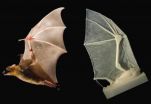(Press-News.org) A new class of influenza drug has been shown effective against drug-resistant strains of the flu virus, according to a study led by University of British Columbia researchers.
Published online today in the journal Science Express, the study details the development of a new drug candidate that prevents the flu virus from spreading from one cell to the next. The drug is shown to successfully treat mice with lethal strains of the flu virus.
In order to spread in the body, the flu virus first uses a protein, called hemagglutinin, to bind to the healthy cell's receptors. Once it has inserted its RNA and replicated, the virus uses an enzyme, called neuraminidase, to sever the connection and move on to the next healthy cell.
"Our drug agent uses the same approach as current flu treatments – by preventing neuraminidase from cutting its ties with the infected cell," says UBC Chemistry Prof. Steve Withers, the study's senior author. "But our agent latches onto this enzyme like a broken key, stuck in a lock, rendering it useless."
The World Health Organization estimates that influenza affects three to five million people globally each year, causing 250,000 to 500,000 deaths. In some pandemic years, the figure rose to millions.
"One of the major challenges of the current flu treatments is that new strains of the flu virus are becoming resistant, leaving us vulnerable to the next pandemic," says Withers, whose team includes researchers from Canada, the UK, and Australia.
"By taking advantage of the virus's own 'molecular machinery' to attach itself," Withers adds. "The new drug could remain effective longer, since resistant virus strains cannot arise without destroying their own mechanism for infection."
INFORMATION:BACKGROUND | NEW FLU DRUG
Partners and funders
The research is funded by the Canadian Institutes of Health Research, the Canada Foundation for Innovation, the British Columbia Knowledge Development Fund.
The research team includes scientists from UBC, Simon Fraser University, and Centre for Disease Control in B.C., the University of Bath in the U.K. and CSIRO Materials Science and Engineering in Australia.
The new drug technology was developed in collaboration with The Centre for Drug Research and Development (CDRD) and has been advanced into CDRD Ventures' Inc., CDRD's commercialization vehicle, in order to secure private sector partners and investors to develop it through clinical trials.
The CDRD is Canada's national drug development and commercialization centre, which provides expertise and infrastructure to enable researchers from leading health research institutions to advance promising early-stage drug candidates. CDRD's mandate is to de-risk discoveries stemming from publicly-funded health research and transform them into viable investment opportunities for the private sector — thus successfully bridging the commercialization gap between academia and industry, and translating research discoveries into new therapies for patients.
END
Researchers have successfully applied a novel method of vaccine creation for Chikungunya virus (CHIKV) using a technique called large scale random codon re-encoding. Using this approach, a group from the UMR_D 190, Emerging viruses Department in Marseille, France in collaboration with the University of Sydney, Australia, demonstrated that the engineered viruses exhibit a stable phenotype with a significantly decreased viral fitness (i.e., replication capacity), making it a new vaccine candidate for this emerging viral disease. This new report publishes on February 21 in ...
In reef-building corals variations within genes involved in immunity and response to stress correlate to water temperature and clarity, finds a study published in BioMed Central's open access journal BMC Genetics. This information could be used to conserve or rebuild reefs in areas affected by climate change, by changes in extreme weather patterns, increasing sedimentation or altered land use.
A research team led by the Australian Institute of Marine Science, and in collaboration with Penn State University and the Aix-Marseille University, studied DNA variations (Single ...
Bacteria become resistant to antibiotics when stressed, finds research published in BioMed Central's open access journal BMC Evolutionary Biology. In particular E. coli grown at high temperatures become resistant to rifampicin.
It is generally thought that antibiotic resistance is costly to maintain, for example mutations which reduce antibiotic uptake also restrict the amount of nutrients entering the cell. Consequently in the absence of antibiotics non-resistant bacteria will out-compete the resistant ones. However researchers from UC Irvine and Faculté de Médicine ...
What: The U.S. government today released two new documents to guide researchers in carrying out dual use research of concern.
First, the White House Office of Science and Technology Policy today published a draft policy for public comment that proposes to formalize the roles and responsibilities of institutions and researchers when they are conducting certain types of research on specific pathogens and toxins. Researchers are often best poised to understand the potential misuse of the information, technologies and products emanating from their research and to propose ...
Many nations battling malaria face an economic dilemma: spend money indefinitely to control malaria transmission or commit additional resources to eliminate transmission completely. A review of malaria elimination conducted by researchers at the Johns Hopkins Malaria Research Institute and other institutions suggests stopping malaria transmission completely has longlasting benefits for many countries and that once eliminated, the disease is unlikely to reemerge over time. Furthermore, total eradication of malaria may not be necessary before countries that eliminate the ...
Boston, MA — The large antiretroviral treatment (ART) scale-up in a rural community in KwaZulu-Natal, South Africa, has led to a rapid and dramatic increase in population adult life expectancy—a gain of 11.3 years over eight calendar years (2004-2011)—and the benefit of providing ART far outweighs the cost, according to new research from Harvard School of Public Health (HSPH).
While previous studies have shown that ART significantly improves survival in clinical cohorts of HIV patients receiving ART, this is the first study to directly measure the full population-level ...
Evidence from Siberian caves suggests that a global temperature rise of 1.5 degrees Celsius could see permanently frozen ground thaw over a large area of Siberia, threatening release of carbon from soils, and damage to natural and human environments.
A thaw in Siberia's permafrost (ground frozen throughout the year) could release over 1000 giga-tonnes of the greenhouse gases carbon dioxide and methane into the atmosphere, potentially enhancing global warming.
The data comes from an international team led by Oxford University scientists studying stalactites and stalagmites ...
For older adults looking to sharpen their mental abilities, it might be time to log on to Facebook.
Preliminary research findings from the University of Arizona suggest that men and women older than 65 who learn to use Facebook could see a boost in cognitive function.
Janelle Wohltmann, a graduate student in the UA department of psychology, set out to see whether teaching older adults to use the popular social networking site could help improve their cognitive performance and make them feel more socially connected.
Her preliminary findings, which she shared this month ...
Washington, D.C.—Solar geoengineering is a proposed approach to reduce the effects of climate change due to greenhouse gasses by deflecting some of the sun's incoming radiation. This type of proposed solution carries with it a number of uncertainties, however, including geopolitical questions about who would be in charge of the activity and its goals.
New modeling work from Carnegie's Katharine Ricke and Ken Caldeira shows that if a powerful coalition ever decided to deploy a geoengineering system, they would have incentive to exclude other countries from participating ...
VIDEO:
The strong, flapping flight of bats offers great possibilities for the design of small aircraft, among other applications. By building a robotic bat wing, Brown researchers have uncovered flight secrets...
Click here for more information.
PROVIDENCE, R.I. [Brown University] — Researchers at Brown University have developed a robotic bat wing that is providing valuable new information about dynamics of flapping flight in real bats.
The robot, which mimics the wing ...

